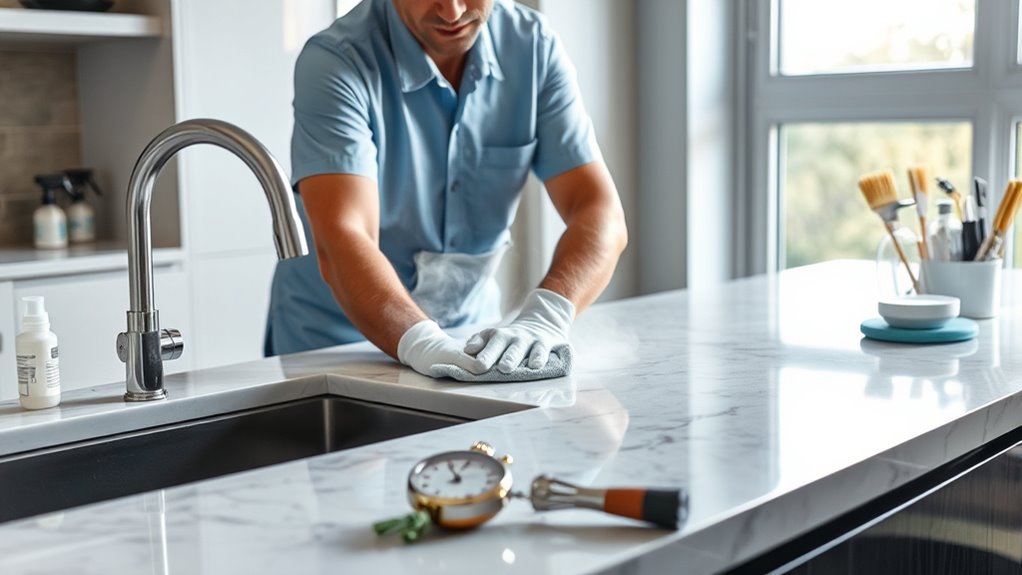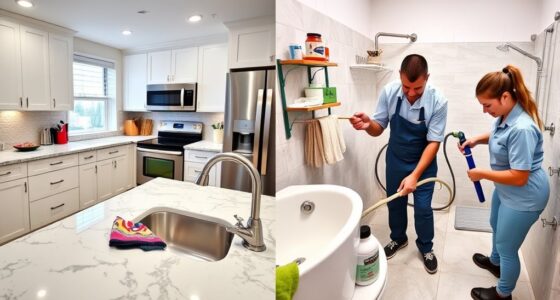The time it takes to clean a space varies based on its size, condition, and the techniques used. For small areas, a quick tidy-up may take 30 minutes, while larger or heavily soiled spaces can take several hours. Factors like whether deep cleaning or just a light refresh is needed also influence the duration. Understanding your cleaner’s process can help you plan better—continue exploring to learn how different techniques affect cleaning times.
Key Takeaways
- The cleaning duration depends on factors like space size, cleaning techniques, and depth of cleaning required.
- Different methods, such as steam cleaning or vacuuming, have varying time frames based on thoroughness.
- Deep cleaning typically takes longer than quick surface cleaning, influenced by the number of tasks involved.
- Communicate with your cleaner to understand average time estimates for specific services and tasks.
- Tracking cleaning durations helps plan schedules effectively and set realistic expectations for thoroughness.

Understanding how long a cleaning process takes can help you plan your schedule more effectively. When you’re aware of the typical timeframes involved, you can allocate enough time for thorough cleaning without feeling rushed or overwhelmed. This knowledge also allows you to communicate clearly with your cleaner or cleaning service, making sure everyone is on the same page. One key factor in estimating cleaning duration is understanding the cleaning techniques used. Different methods, such as steam cleaning, vacuuming, or detailed dusting, require varying amounts of time. For example, deep cleaning a carpet with steam may take longer than quick vacuuming, but it also results in a more thorough job. Recognizing which techniques are necessary for your space helps you set realistic expectations for how long the process will take. Additionally, understanding the lifestyle benefits of efficient cleaning routines can motivate you to maintain regular schedules, ultimately saving time and effort. Effective time management is essential when scheduling cleaning sessions. If you know how long certain tasks typically take, you can plan your day around those periods. For instance, setting aside a couple of hours for a deep clean on the weekend prevents last-minute rushes and guarantees the job is done properly. Break larger cleaning projects into smaller segments, spreading them out over days if needed. This approach not only makes the task less intimidating but also guarantees a more complete clean, as each section receives focused attention. Keeping track of how long your cleaner needs for different tasks can also help you refine your scheduling over time. You might notice that dusting takes 15 minutes, while bathroom scrubbing takes 30 minutes. With this information, you can create a cleaning timetable that maximizes efficiency and minimizes downtime. Moreover, understanding the typical duration of various cleaning techniques helps you avoid overloading your schedule or underestimating the time needed for a proper clean. Be realistic about your expectations, and don’t rush the process. Rushing can lead to missed spots and incomplete cleaning, which defeats the purpose. If you’re hiring a professional cleaning service, ask them about their typical timeframes for each type of cleaning they perform. This insight allows you to plan your activities around their schedule and guarantees you get the results you want within the desired timeframe. In the end, mastering the relationship between cleaning techniques and time management makes your cleaning routine more efficient and less stressful. It helps you keep your space spotless without sacrificing your valuable time or energy.
Frequently Asked Questions
How Do Cleaners Estimate Their Cleaning Time?
Cleaners estimate their cleaning time based on cleaning efficiency and time management skills. They assess the size of the space, the level of dirt, and specific tasks needed. Experienced cleaners consider how long each task takes, adjusting for obstacles or special requests. By managing their workflow effectively, they can give an accurate estimate, ensuring you know how long your cleaning will take and maintaining quality without rushing.
Does Cleaning Time Vary by Type of Property?
Cleaning time definitely varies by property type, property size, and cleaning complexity. Larger homes or spaces with more rooms take longer, while smaller or simpler properties get cleaned faster. You’ll find that a spacious house with intricate details demands more attention, whereas a compact apartment needs less effort. So, always consider property size and cleaning complexity to get a realistic estimate of how long your cleaning will take.
Can I Request a Quicker or More Thorough Cleaning?
You can definitely request a quicker or more thorough cleaning, but keep in mind that cleaning frequency impacts both your needs and costs. If you ask for a faster service, it might reduce cleaning costs but could affect quality. Conversely, more thorough cleanings may take longer and cost more. Communicate your preferences clearly with your cleaner, so they can tailor the process to meet your expectations while balancing time and budget.
How Does Cleaning Time Differ With Special Cleaning Requests?
Special cleaning requests can greatly influence the cleaning time, as they often require extra effort or specific attention to areas. Your cleaner considers your client preferences, like deep cleaning or delicate surfaces, which may extend the process. Communicate your needs clearly upfront so they can allocate adequate time. This ensures your special cleaning requests are handled efficiently, aligning with your expectations while maintaining quality.
What Factors Influence Unexpected Delays in Cleaning?
Unexpected delays often occur because of factors like unavailable cleaning supplies or staff inefficiency, which can increase cleaning time by up to 30%. When supplies are missing or staff isn’t fully efficient, tasks take longer, disrupting schedules. You can help minimize delays by ensuring supplies are stocked and staff are well-trained. Being proactive allows your cleaner to work smoothly, maintaining efficiency and avoiding unforeseen setbacks during your cleaning session.
Conclusion
Remember, a thorough clean isn’t just about speed—it’s about quality. Think of your cleaner like a skilled artist, carefully crafting each stroke to transform your space. Rushing through it is like trying to finish a masterpiece in a minute; the details get lost. So, trust the process. When you give your cleaner enough time, you’re investing in a spotless space that truly feels refreshed—like a fresh coat of paint that renews the entire room.










